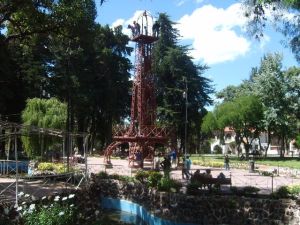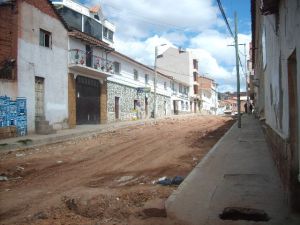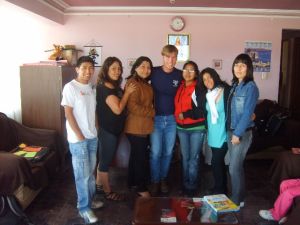Plans vs. Reality
Before I arrived in Sucre my head was full of ideas of things I wanted to do for I knew I would be there for almost a month. I wanted to do private Spanish classes, a rock climbing course, biking excursions to explore the indigenous villages around Sucre, do sports and last but not least: relax.
Reality soon showed me a different picture. At the very first day I was busy with visiting and choosing language schools and I think I made the luckiest choice with the small non-profit oriented FENIX. The main reasons I went for them were the lovely teachers welcoming me and, maybe even more, their charity work. The school offers free English classes for local people without money in order to give those better opportunities for their future. They also do a lot of other things for poor people. Soon I found myself in the middle of charity work. But that, later.
With running or swimming in the 50m Olympic pool in the morning and lessons normally from 12 to 3 my days were already full and I could not think of doing a climbing course. Furthermore I found myself in a nice social network between people from school, including teachers and people from my great hostal (Pachamama). So that was my daily routine in Sucre.
Climbing
Arriving at Hostal Pachamama the first day I made acquaintance to Niklas, a likable German guy who resembled a lot John Lennon in his later days. And indeed he turned out to be a big fan of him and a couple of times he quoted lines of his songs. He also is a climber and got his climbing harness with him. Earlier he got to know Jon, a Canadian guy, who was in Sucre too and had a rope and harness too. It wasn’t long and we made up for climbing at Sica Sica, a prepared rock at the nearest mountain. First we didn’t find the prepared wall and we lost quite some time until we finally found the spot and did a couple of climbs.
Maybe after that day my longing for climbing was already satisfied and I didn’t bother anymore for doing a course.
Charity work
Already at my first day after school I could contribute myself to charity. There were 600 presents to be prepared for the poor children of the city. We filled the Christmas bags with toys, sweets and clothes and categorized them into male and female and ages (a 14 year old girl has other needs than a 3 year old boy). In the streets we handed out flyers to poor children inviting them to our school where they would receive a present. At the next day I became a witness of how many children lined up in front of the house. After some work in the background I switched my job to the front line and handed over to every child a banana and a yoghurt drink. Some children and mothers with their babies thanked us gratefully and they seemed to receive a moment of happiness, others where weeping and almost anxiously grabbing their presents, others were not satisfied with what they received and cried for more. And then there were those that tried to receive presents a couple of times by lining up again and again. But they could be identified because we marked every child receiving a present with a black marker. Of course, there were the smart ones that washed it away, but Jimena, a teacher, had a really good eye and also unbelievably recognised returning people. All in all it was a very special experience to be in the front line of charity work, not only spending money, but actually doing the work. It was great and very sad at the same time. Glorious moments were exchanged with moments of disbelief of how such poverty can exist in the middle of us. Some babies and small children did not have clothes on, and on some you could see they were sick and needed medical help too. I felt completely helpless looking into the beautiful dark, innocent eyes of those poor children who had the bad luck being born into poverty. At some point we ran out of presents and we had to close the door and send all the rest away that was still lining up. There were so many more out there. For how long they had waited only to be disappointed I don’t know.
The school also supports an asylum for old people that have mostly been abandoned from their family and have no one to take care of them and scarcely enough for surviving. This asylum is run by nuns and volunteers trough donations. I was told stories like these: once they’ve visited them and brought presents and bananas, the old people asked: “Is it Sunday? “ A banana is such a rare thing for them that it would only be received on special occasions such as Sundays. Normally they have to live on a very cheap diet, which I didn’t dare to ask what it was. An old lady was taken from the street as she almost died of hunger. The school pays a visit there about every month or two, whenever they have some money. All the students made a donation and so we went to the market to buy cakes and yoghurt drinks, we went to buy some kind of health body cream and carried it all to the asylum. We were welcomed by some lively elderly people, but also a lot of them seemed to be unconscious of what was happening. They applauded us when we entered the courtyard where we placed a lot of chairs and helped many of the people to get there by taking them arm in arm or rolling their wheelchairs. A Scottish guy gave a little guitar concert and we provided the olds with our presents. There was a second and a third floor too, full of people that could not come down because their progress of dementia was too far. I’ve been sent to a hospital-like room and we provided them with medical cream. I stopped by the bed of an old woman and she started to talk to me. But I couldn’t understand her. Was my Spanish so bad? I asked Claudia, the daughter of Jimena, who came with us, if she could understand her. She told me, the lady was speaking Quecha, the antique language of the indigenous and she could not understand her either. At least, it was not the fault of my Spanish. What she wanted to tell me I didn’t find out. As she was pressing my hand all the time I assume she only wanted to be close to someone. I got the feeling that this room was for people in their last stage before death. Many of them were injured and unable to move and talk. I saw many sad things in there which I couldn’t name all, but it left a big impression on me. When we were about to leave, some of them grabbed and embraced us and kissed our hands. They didn’t want to let us go. On one hand I didn’t like to be hold back like this, on the other hand how could you possibly refuse a moment of love to these neglected poor people!
By the way, maybe you’ve noticed but in general I don’t make any pictures of people because for me it’s a question of respect. You can find pictures on travel blogs of others or in the internet.
Bolivian life
By taking 3 hours of private lessons a day, there was also some time to talk a lot about other things but grammar during classes with Lourdes, my lovely teacher. Actually, we sometimes almost forgot to include some technical language skills into the lessons. We talked for hours about everything we felt like. And still it was too less time. There was so much fun we had together as well as there were many very sad topics. I told her a lot about the life in Europe and especially Switzerland and found it very sad that she will hardly ever get the chance to visit other countries, not even talking about Europe. Even travelling within the own country is difficult to arrange because money is always a very rare resource, even that she has a university degree, is fluent in English and really is a good teacher. But as a single mother with great responsibility, life is difficult in Bolivia. It felt strange me, a foreigner, telling her how Lake Titicaca was like, a place in her own country.
The traditional Bolivia is still a very macho-like country. It is considered as normal if a man beats up his wife. And even women tell each other that they have to endure the pain the husband distributes over the family. In traditional families the children learn their role already as a child. A boy is not expected in the kitchen and the daughters have to wash the clothes for their brothers too as the boys are told that they won’t need to wash, that’s the women’s role. And think: the washing is normally done by hand. Furthermore men won’t allow their wives to use contraceptives, because they fear their wife could sleep with other men. This logic and how the men would recognize their kids as their own ones and not anybody else’s remains a riddle for me. Fact is the men don’t allow their wives to have any kind of interests in other men while they take ever possibility to fuck around. The men beating up their wives and children are hardly ever punished by law as the police are corrupt and men will help men. (I want to point out that I also met a few great men that would never ever commit abuses.)
I heard examples of sexual abuse of children by fathers, uncles and other male family members and the delinquents would rarely ever have to pay for their life destroying deeds. It’s a vicious circle: How can a child, hardly educated and exposed to an environment in which they learn to suffer of violence and horror, ever grow up without having social behaviour problems themselves? There are many examples of fathers being a drinker or gone for other reasons so the family’s son of barely a teenage age need’s to organize the money for the family’s survival.
The list of social misbehaviour could be continued much longer, but when I looked at the young population in the cities I can recognize certain good signals. Young men and boys are staying in the kitchen and help in the household, carry their children through the streets without being ashamed and flattering their chosen girl. Looking at the young girls they don’t look like they’d accept any kind of suppression by their men. My observations have been confirmed by locals. It is still a painful long way to go but at least there is hope in the youth to change this old fashioned cruel role play.
Spanish school
One reason because I couldn’t spend much time on blog writing was that most of my homework consisted of writing a text, which I took seriously. A few masterpieces (with many mistakes though, later corrected together with my lector, Lourdes) were written during this time, including a Spanish translation of the Mani Matter song “Alpeflug”.
As I wrote before I really had a tremendous relationship not only with my teacher, whom I will be missing a lot, but with other teachers and students too. I really didn’t want to leave, assuming that I possibly will never come back (but I will, if I can arrange it). This is another very sad part of my travel to leave them behind. The risk of being stuck in Sucre was huge so luckily I had a fix departure date with GAP adventures and my deep wish to see the wonders of Patagonia too. And therefore after 4 weeks I needed to go. I’m also very much looking forward to meeting up with my best mate from home in early February in Santiago. Michelli, we’re going to rock it!
But I was about to write about the school. Beside various charity work, the school offered activities like cooking class (yes, I attended! Unbelievable, right?), a Christmas dinner on which they explained local traditions for the New Year (I know now why the girls all wear red underwear on New Year’s Eve, why there is so much false money around to be bought, why people are talking to the moon and counting their false money, why they pure wine on a model house of their dreams and why they put a cigarette into the mouth of a copper frog) and playing Wallyball. This is a volleyball like game in which some rules are adapted. You can use all body parts for playing and the walls can be used as well. It’s a very much fun game to play and you need to get away from the nice volleyball plays. By using the feet and smashing the ball to the wall the game offers many more playing alternatives. Because I liked it so much I successfully arranged some extra days for playing.
This is going to be a bit technical, but the effect of the classes to my Spanish knowledge is as follows: I can use the different paste senses in a more correct way and I realized the importance and the difference between them. I repeated the future and conditional senses, got into present and past Subjuntivo and the similar imperative (positive and negative). Just think that for the Subjuntivo past there are two different forms with equal signification. One is more spoken language, the other more written, but not only… Theoretically I now know or can build with my knowledge all the following tenses: 7 different past tenses (Preterito, Preterito imperfecto, Preterito perfecto, present perfect, past ferfect, subjuntivo imperfect in two ways and subjuntivo past perfect in two ways), 3 present tenses (present, subjuntivo present, subjuntivo present perfect), 3 future tenses (ir a + infinitive, future, future perfect) while the 2 future subjuntivo tenses I have not learned yet, 2 condicional forms (condicional, condicional perfect), 2 imperative forms (affirmative and netative) and of course the gerundio. This are just about 20 different tenses, and of course with irregular and partly irregular verbs and regular verbs with regular changes in certain persons and tenses (just a few examples for the first person singular of the verb preferir: prefiero (present), preferí (preterito), preferiré (future), prefiera (subjuntivo present)… you see the game with the e / i changes? There is lot more going on with o and u that sometimes changes and sometimes not… You can imagine that I sometimes (well, actually a lot) get totally confused. There are some verbs I can never get right!
See here the example of the regular verb amar:
Unfortunately, the conjugation of the verbs is not the only difficult thing in Spanish language, but I spare you now the details of this…
Swiss connections
Thanks to Kathrin, a Swiss girl living in Denver, who was in the same hostal, I finally came to the wonderful experience of eating Swiss Cheese and the highlight was when we made a fantastic Raclette for dinner! Well, besides my friends and the nature there is not really much that connects me unbreakable to Switzerland. But one thing I do long for: good cheese! I had so much cheese the last few days that I hope it gets me through the next 3 months… Oh, I messed up the potatoes for the Raclette: I kept boiling them for 1,5 hours because I just forgot them while I was drinking wine with others. With the ones we couldn’t use I made Walliser Röschti 2 days later.
Resume
The city of Sucre is nice but the amount of poverty and the lack of good restaurants with fair alternatives are the downsides of the city. But as so often, it’s the people, not the place that makes the difference. And for that I left a piece of my heart in sweet Sucre. Really!
Eiffel Tower at Parque Bolivar, where I used to run my laps
The road to school might be dirty and dangerous, but it was worth every day!
The complete team of teachers and me
PS: Special thanks to Lourdes, Yashira, Pippo, Vera, Kathrin, Melanie (whom I remet after the Jungle trip in Manu), Axel and Niklas and of course all the rest at FENIX and their friends! Miss you all!




